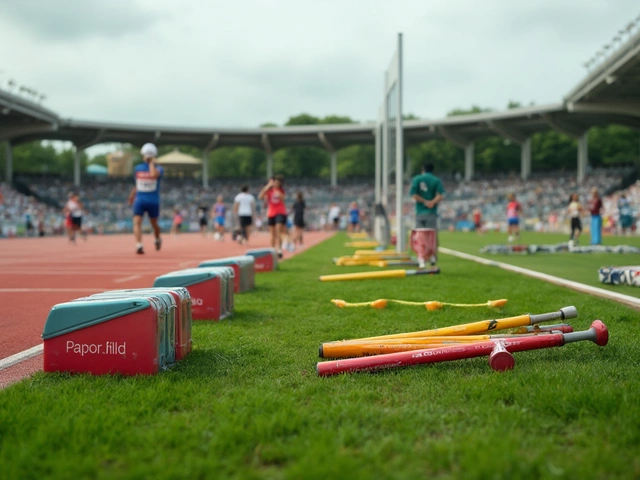Is Running a 10k Impressive? Here's What You Need to Know
So you're wondering if running a 10k is impressive? It might sound like just another run to some, but trust me, crossing that finish line feels anything but ordinary. Picture this: 10 kilometers of you against the pavement, pushing through every stride, every bead of sweat. It's about more than just the distance; it’s about the dedication and consistency that gets you there.
Let’s break it down. A 10k is often viewed as a sweet spot in the running world. Not as intimidating as a marathon but still a significant challenge, it’s the perfect target for anyone looking to step up from the standard 5k. Whether you're just getting into running or already have a few races under your belt, aiming for a 10k can boost your confidence and enhance your fitness levels.
- Understanding the 10k Milestone
- Why a 10k is Not Just Any Run
- Training Tips for Your First 10k
- The Bigger Picture: Health and Beyond
Understanding the 10k Milestone
Diving into the world of running, you'll quickly learn that the 10k is a big deal. You might ask yourself, what's so special about 6.2 miles? Well, for starters, it's a distance that strikes the perfect balance. It's long enough to challenge you but short enough to be within reach, even if you're new to the running scene.
Let's talk numbers. A decent finish time for a 10k typically ranges between 50 to 70 minutes, depending on your conditioning and whether you’re a newbie or a seasoned runner. With dedication, many beginners find themselves reaching personal bests around the one-hour mark. The training to achieve this pushes you through the 'fun zone' of jogging to a more structured routine.
- You'll need to comfortably manage your pace across different terrains.
- Hydration strategies become crucial as you clock in more miles than a 5k.
- Nutritional tweaks might be necessary to fuel your longer efforts.
A fun part of getting into a 10k is joining a community of runners who share tips and motivate each other. Plus, 10k races are popular community events, often supporting charities and drawing crowds that cheer you to the finish line, which is an extra motivator.
Why is a 10k seen as an essential milestone in marathon training? Because it helps you build stamina and develop discipline. It’s like a gateway, preparing you for even longer distances if you catch the running bug. Each 10k race or personal practice run builds your confidence and sets you up for future challenges like half-marathons.
So, while the number '10k' might just seem like another target, it's a stepping stone to bigger running dreams and a meaningful achievement on its own. Completing one can bring a sense of accomplishment and can even hook you onto the joy of running long-term.
Why a 10k is Not Just Any Run
Okay, let's get something straight: a 10k might seem like a random number, but it packs a punch in the running world. Think about it—10 kilometers is about 6.2 miles, which is no small feat when you're pounding the pavement. Now, why is this distance revered by so many? It's because the 10k sits comfortably between short sprints and the grueling marathon.
One of the compelling reasons a 10k stands out is the blend of speed and endurance it demands. You're not just plodding along like in longer races; you have to maintain a swift pace, which challenges both your aerobic capacity and mental grit. This makes it an excellent test of your overall fitness.
Plus, a 10k is a popular distance for competitive races and charity events. So, not only does it boost your personal fitness, but it also connects you with a vibrant community of runners, from novices to experienced racers.
- A great stepping stone if you're eyeing a half marathon or even a full marathon down the line.
- Easier to fit into a busy schedule compared to training for longer races.
- Generally, less physically taxing on the body with lower risk of injury compared to marathons.
Moreover, according to the Association of Road Racing Statisticians, the 10k is one of the most globally participated race distances, drawing folks from all walks of life. It's a testament to its widespread appeal and accessibility.
Training for a 10k also cuts down those lazy excuses to skip workouts. It requires a structured plan, incorporating both distance and interval training. And because of that, completing one isn't just about showing off; it's an achievement that reflects dedication and a new level of fitness.

Training Tips for Your First 10k
Getting ready to tackle your first 10k? It’s all about having the right plan and sticking to it. Trust me, even if the distance sounds daunting at first, with the right approach, you'll surprise yourself with what you can achieve.
First things first, consistency is key. Make a training schedule and commit to it. Aim for a mix of different runs throughout the week: easy runs, speed workouts, and a longer run on the weekend to build endurance. Try to hit about 20-30 minutes for your shorter runs a couple of times a week.
- Start Slow: If you’re new to running, ease into the training. Begin with comfortable paces, and gradually increase the intensity and duration. The goal is to avoid injuries by not overdoing it.
- Include Tempo Runs: These runs help increase your pace and stamina. A typical tempo run might involve running at a challenging, yet sustainable pace for about 20 minutes within your workout.
- Rest and Recover: Don’t underestimate the power of rest. Your muscles need time to repair and grow stronger. Include rest days in your schedule to prevent burnout and injuries.
- Strength Training: Incorporate strength exercises, focusing on your core and legs. Think squats, lunges, and planks. This not only enhances performance but also helps prevent common running injuries.
- Fuel Right: Keep your body energized with a balanced diet. Carbs are your friend for those longer runs, but don't forget proteins for muscle recovery.
And here’s a fun fact: Research has shown that runners are less likely to face heart-related issues compared to non-runners. So, there's a health benefit to this distance too!
| Week | Total Running Time (Minutes) | Rest Days |
|---|---|---|
| 1 | 60-90 | 2 |
| 2 | 80-100 | 2 |
| 3 | 100-120 | 2 |
| 4 | 120-140 | 1 |
| 5 | 150-170 | 1 |
| 6 | 180 (Race Week) | 2 |
Remember, the journey to a 10k is as rewarding as the finish line. Stick to your plan, listen to your body, and keep your goals in sight. Before you know it, you'll be crossing that finish line with pride.
The Bigger Picture: Health and Beyond
Running a 10k isn't just about bragging rights; it's about supercharging your health in ways you might not expect. Sure, we all know that running helps burn calories and shed a few pounds, but did you know it does a whole lot more?
Let's start with your heart. Regular running can lower your blood pressure and cholesterol levels, which means you're actively reducing the risk of heart disease every time you lace up those shoes. Plus, a 10k offers a great mix of endurance and speed training, giving your cardiovascular system a boost.
But that's not all. Running also releases endorphins, those lovely chemicals that make you feel oh-so-good. It's like your body’s natural mood lifter. Trust me, after a long day, there’s something magical about heading out for a run and coming back feeling on top of the world.
Besides the physical perks, a consistent running routine can enhance your mental resilience. Pushing yourself to conquer a 10k means overcoming doubts and barriers, which can translate to better stress management in daily life.
You might be wondering about the whole long-term aspect too. Regularly nailing that 10k could be your gateway to longer distances, like half-marathons or even marathons. It's like training your mind and body for bigger challenges. It’s all about progression; one step leads to the next.
Take a look at this simple table of benefits:
| Benefit | Impact |
|---|---|
| Cardiovascular Health | Improved heart function, reduced disease risk |
| Mental Well-being | Enhanced mood, stress relief |
| Weight Management | Burn calories, boost metabolism |
| Future Goals | Preparation for longer races |
So, whether it's the health benefits or the emotional boost, running a 10k gives you more than just a morning well spent. It's about building a better you, one kilometer at a time.







